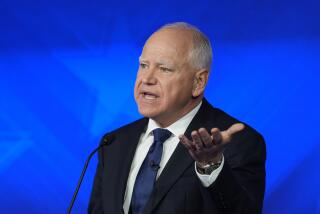PERSPECTIVE ON PATRIOTISM : One Policy for China, One for U.S.? : Bush encouraged Chinese students here to speak against Beijing; were Clinton’s anti-war protests any different?
- Share via
Time: Year 2000.
Place: People’s Republic of China.
Event: campaigning for the National People’s Congress in China’s first free election.
Among the candidates running for office is one who was educated in the United States, and who, in 1989 after the massacre in Beijing, participated in demonstrations at the U.S. university where he was studying. One of the controversial issues of the campaign is whether the candidate who demonstrated against the then-repressive regime in China is now fit to serve in public office. Were his activities in the United States unpatriotic? Is it wrong to demonstrate against your own country on a foreign soil?
The recent controversy President Bush stirred up with respect to Bill Clinton’s demonstrations against the Vietnam War while he was studying in London 23 years ago directs my thoughts to this possible scenario in Chinese politics. If one’s legitimate political involvement can become the central issue of an election in the United States, which treasures its First Amendment rights, it could only become more controversial in a country that had just moved toward democracy.
As a Chinese student who witnessed the massacre in Beijing in June, 1989, and who testified before the Congressional Human Rights Caucus about the brutality and cruelty committed upon my fellow citizens, I seriously question President Bush’s statement: “It is wrong to demonstrate against your own country in a foreign country.”
If there was something morally wrong about demonstrating against the Vietnam War in London, how can one justify the fact that thousands of Chinese students studying in the United States and other Western countries spoke out and demonstrated against the bloody crackdown on peaceful students and citizens?
On June 6, 1989, two days after the massacre, President Bush met personally in the White House with some Chinese students. During the meeting, Bush told them that supporters of the democratic movement in China should “speak out against the brutality.” If President Bush believed at the time that it was morally wrong to speak out against one’s own country on foreign soil, why did he say this to the Chinese students? If he truly believed that Chinese citizens should speak out against a government running amok, then what is the difference between what Clinton did 23 years ago and what the Chinese students did in 1989?
Some people may try to make a distinction between the Johnson Administration and the Beijing regime--the American government was freely elected, while that in Beijing was a dictatorship. But no matter how each government was formed, many thousands of patriotic Americans in and out of this country strongly opposed the Vietnam War. James Madison, one of the founding fathers of this great nation, once said, “If men were angels, no government would be necessary. If angels were to govern men, neither external nor internal controls on government would be necessary.” Thus, I fail to see any fundamental difference between the American people demonstrating against the unpopular war and the Chinese students demonstrating against the repressive regime in China, both on foreign soil.
Furthermore, we must distinguish between the government running the country and the country itself. When one speaks out against certain governmental policies, it is done because of love of country. To label such protest as “unpatriotic” is absurd. When thousands of Chinese students at home and abroad demonstrated against the repressive government, they were not acting against the interests of their country. On the contrary, they were deeply concerned about the future of the country.
The following has been attributed to Abraham Lincoln: “There is an important sense in which government is distinctive from administration. One is perpetual, the other is temporary and changeable. A man may be loyal to his government and yet oppose the particular principles and methods of administration.” To paraphrase, one can argue that a man may be loyal to his country and yet oppose the particular principles and methods of his government.
After my testimony before Congress about what I saw near Tian An Men Square in June, 1989, I received mixed reactions from my Chinese friends. Some thought it was a courageous act. Others resented the fact that I “aired the dirty linen” in public before a foreign government. My response then, and now, is that citizens of a country should, and in fact have an obligation to, exercise their constitutionally guaranteed rights no matter where they are. When people fail to tell the truth when their fellow citizens are being killed, how will they live with their inner selves?
In light of this sad scenario in American politics, Chinese students who demonstrated against the Beijing regime in 1989 will have to be prepared for the accusation of being unpatriotic when, one day, they are able to run for public office in China. It is hoped that public sentiment and the final result of the issue in the United States will set a good example for the future scenario in a free China.
More to Read
Sign up for Essential California
The most important California stories and recommendations in your inbox every morning.
You may occasionally receive promotional content from the Los Angeles Times.










